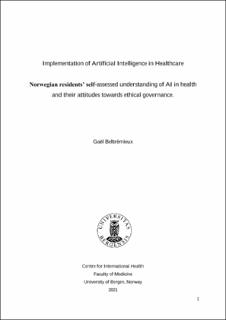| dc.description.abstract | BACKGROUND: Artificial intelligence’s (AI) influence in the domain of health is expected to increase. In order to enter the public debate, the citizens, as stakeholders, need to be knowledgeable about AI and health and aware of the ethical issues that it involves. OBJECTIVES: We want to explore people’s self-reported level of knowledge and their attitudes towards use of AI in health. METHOD: We have therefore asked a sample of 1015 respondents residing in Norway about their knowledge of, and attitudes towards, AI in health. More concretely, this study explores the self-assessed general knowledge of how AI technology works, attitudes towards implementation of AI in healthcare, decision-making based on AI, use of robots in elderly care and the need for legal regulation of the use of AI in health. RESULTS: This exploratory study reveals that Norwegian residents have a rather high self-assessed understanding of AI and its implementation in healthcare. They are aware of the ethical issues brought by implementing robots in elder care. They would generally trust a healthcare decision based on AI results if it’s reviewed by a medical doctor but they would generally not trust it if it’s not reviewed by a medical doctor. They also largely agreed on the need for legal regulation of AI in health. The analysis showed that the knowledge about AI is significantly lower among women, elders, respondents with secondary education and low household incomes. The opposite is true for men, under 40 years old, other education levels and high household incomes. The respondents assessing a lower understanding of AI have the tendency to be more sceptical towards the use of robots for elder care and the decision making based on AI with and without the approval of a medical doctor as opposed to those with higher self-assessed understanding. When it comes to decisions directly based on AI without the approval of a Medical doctor and the need of a legal regulation to control AI in health, there were no significant differences between the educational groups. More research is necessary to explains those tendencies. | |
